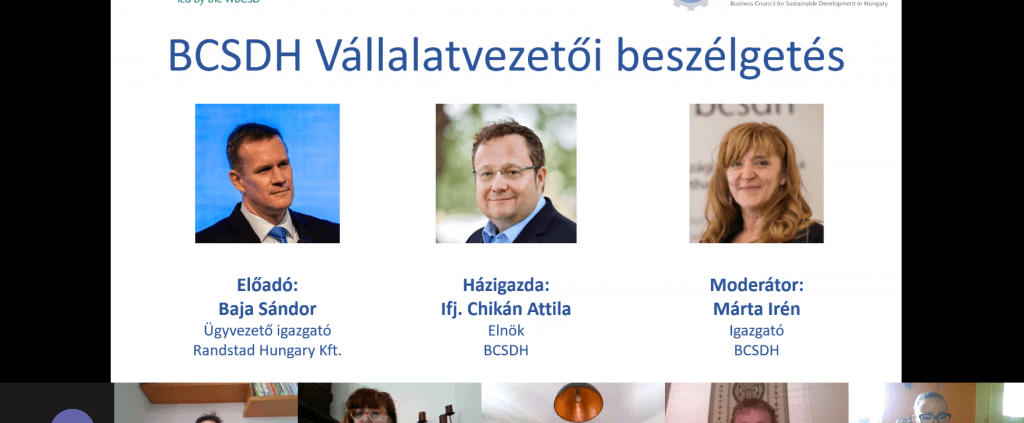How and at what price can we keep our employees?
There is no question that the key to successfully rebooting the economy is retaining employees, but how and at what price can we do this? Sándor Baja, Managing Director of Randstad, had a conversation with the leaders of BCSDH’s member companies about this issue.
The online event was organized as the first item in the newly launched CEO discussion session of the Business Council for Sustainable Development in Hungary (BCSDH). The organization, which brings together 94 member companies that account for 30% of GDP, considers it important to create a forum for business leaders at which their dilemmas can be frankly discussed, and their solutions to the challenges of the current situation can be shared. This will also support the rebooting of the economy, and, as lessons are learned, it will help to create a more sustainable new course for business. The host of the event was Sándor Baja, who is also a member of the BCSDH Advisory board, and moreover the leader of the Action 2020 Employment working group.

As a result of the pandemic, CEOs face a number of new challenges. In almost every sector, hundreds of thousands had to switch to working from home within a matter of days. There are also serious disruptions in the supply chain that formerly always operated reliably, and demand has also changed drastically, thereby transforming the need for labor. Many companies are making real efforts to avoid having to lay off their employees, but the number of unemployed people has already increased exponentially. Many employees are now on forced leave, and in terms of wages a significant decline can be expected.
“As the crisis is extended, so is the uncertainty. Honest communication with employees becomes extremely important, because otherwise distrust can make it difficult to operate and restart. The labor market is also radically changing. We need to prepare for a longer transitional period in which we need to reboot the economy from its frozen status, while still living with the virus. The home office is becoming deeply important, but employees who still return to the workplace also require completely new conditions. The development of this infrastructure and culture is now the task of companies. Once the virus is defeated, the most important thing will be to maintain a more flexible and sustainable labor market in the long run” explained Sándor Baja in his presentation.
The tasks demanded of companies are often completely new, and involve changing to absolutely unexplored business models from one day to another, which requires an entirely different approach and a high degree of flexibility from both employers and employees.
However, the current situation may lead to more flexible and sustainable employment later on when the economy reboots, just like BCSDH’s Action2020 Recommendations on Employment called for in 2017.
Several members of BCSDH have reported about their effective job-preserving measures, and company leaders have confirmed that processes need to operate in a more sustainable way after the economy has rebooted.






Leave a Reply
Want to join the discussion?Feel free to contribute!